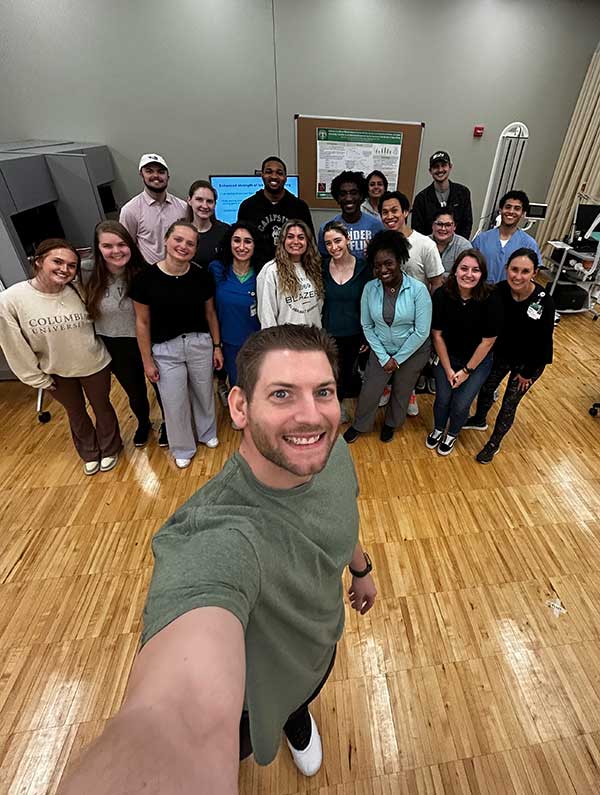“ There simply wasn’t enough time to play electric guitar in my band, too,” he said about the change with a laugh.
There simply wasn’t enough time to play electric guitar in my band, too,” he said about the change with a laugh.
In addition to music, Ballmann always had a deep affinity for sports and exercise, so he decided to pursue a degree in kinesiology at Auburn, where he went on to receive undergraduate, master’s and doctoral degrees in exercise physiology.
“I decided to just focus on exercise because at the time, I thought it would be my greatest opportunity to reach others and improve people’s health,” he said. “I don’t know what it was, but at the time, I was just so drawn to exercise. I just fell in love with it and saw so much potential to help others.”
Little did he know at the time, though, that he would return to his musical roots in a combination of his dual passions: studying music-based exercise as interventions for health disorders.
After completing his postdoctoral fellowship at the UAB School of Medicine in Cardiovascular Disease, he joined Samford University as a faculty member for seven years before returning to UAB as an associate professor in the School of Education and Human Science’s Department of Human Studies.
“I’ve been really focused on finding ways to improve athletic performance and exercise recovery using music,” Ballmann said.
Once at UAB, he got connected with CEDHARS Director Dr. Jim Rimmer, who he bonded with over common passions for research, music and people.
“The collaborative nature here is unbelievable. Anyone and everyone has helped and been willing to mentor me. It’s already made me a better investigator and scientist. I want to learn all I can from others’ wisdom and experience.”
It was here at UAB where Ballmann developed a stronger purpose in what his research could do for people.
“While I certainly find improving athletic performance meaningful,” Ballmann said. “I started to see deeper meanings and other avenues for the impact that music can make in people’s health. I just had to find an avenue to do that. UAB provided that beautifully.”
Ballmann got involved with Dr. Jereme Wilroy’s CHIME study and other research projects in the CEDHARS Adapted Human Performance Lab. He credits UAB’s collaborative nature, faculty and abundance of mentors across many disciplines for his own recent grant submissions.
Ballmann submitted grants that are in collaboration between the School of Education and the School of Health Professions, which will be largely facilitated by CEDHARS. He’s exploring various ways to investigate the notion of “music as medicine” to specifically target overcoming barriers and addressing disability health inequities. One project involves tailoring music interventions to strategically alleviate physiological and psychological dysfunction to allow for improved exercise capacity.
Among his recent grant submissions, Ballmann submitted an NIH grant with his close collaborator Dr. Alex Evancho, assistant research professor in the department of physical therapy, to study music as a means to improve exercise tolerance for people with Parkinson’s disease (PD).
“Dr. Evancho’s collaboration and experience has been absolutely vital to my development and success since I have arrived at UAB and has opened new avenues of impactful clinical research,” Ballmann said.
Cardiovascular responses to exercise tend to be compromised in PD. Ballmann and Evancho have now shown, through pilot data, that they can manipulate cardiovascular and autonomic function with strategic changes in music type.
“The idea was if someone can’t get their heart rate up and it limits their exercise capacity, we’ll ‘prescribe’ music to increase it to allow for greater exercise engagement and greater exercise-induced health benefits,” Ballmann said. “It’s like hacking physiology with music as medicine.”
Ballmann is also developing an NIH DP2 proposal which would develop a mobile app that users with disease or disability can log daily symptoms and integrate their fitness tracker data to form personalized “music-medicine playlists” to improve exercise ability and overall health.
“I’m still not sure it’s possible,” he said with a laugh. “But I’m going to try for it because I think as a researcher providing interventions, we need to empower people with disabilities or chronic conditions with tools to manage their own health in sustainable ways.”
Although Ballmann was so drawn to exercise (and electric guitar) that he was willing to forgo his scholarship, he never truly left his academic passion for music behind.
“Music is just so ingrained in all of us, practically in our DNA. It connects us and that makes it a perfect conduit for improving health and reaching others.”

